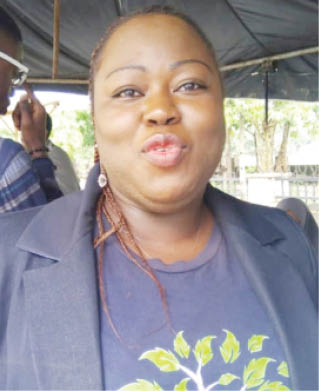‘How we are creating jobs recycling waste’
Olufunto Boroffice is the MD/CEO of Chanja Datti, a waste collection and recycling company based in Abuja, the federal capital city. In this interview, she talks about how the company is creating jobs through recycling waste and its Trash to Cash initiative. Tell us about Chanja Datti? We are a waste collection and recycling […]

Olufunto Boroffice is the MD/CEO of Chanja Datti, a waste collection and recycling company based in Abuja, the federal capital city. In this interview, she talks about how the company is creating jobs through recycling waste and its Trash to Cash initiative.
Tell us about Chanja Datti?
We are a waste collection and recycling company based in Abuja and Akure. We have been in existence since 2015 and the crux of what we are doing is waste work and promotion of secular economy and creation of jobs.
So, we collect recyclable materials. From pure water sachets to cartons, from soft drinks bottles to plastics, nylon to beverage cans. We aggregate them and send them to manufacturers that use them. We also process some of them to secondary raw materials. What you have here are shredded pure water sachets that have been turned into pellets, bags and so on. So instead of throwing out the pure water sachets; they get a second life as they’re being re-used.
We work with organisations that turn the plastic bottles into mattress foam and other products. We work with companies that turn old papers into tissue paper.
Also, we are coming up with innovative ways to get waste collection from households. We have this initiative called Trash for Cash in which you can exchange your trash for cash. We buy waste from people and we have been able to empower about 200 people doing that. We buy the trash at N20 per kilogramme.
Again, we are sending about a hundred children to school this September. They are collecting waste with partner organizations and then the waste is converted to cash to help them go to school. So we are coming up with different ways to encourage people to recycle waste.
What inspired you to start this business?
I think it is concern for the environment. Whenever you walk around, you will see a dump site, especially now that it is raining. Flooding is happening because a lot of our drainages are filled up with dirt. These are things that can potentially be recycled. And the fact that a lot of people don’t have jobs. So, currently, our company employs about 200 people who are along the value chain. We have people who collect and people who process the waste. That is how we create jobs.
Did you have to acquire any skill to do this?
No. Just on the job training. I read about it online and there has been a lot of trial by error as well. I also learn from people that have experience on this. So I am surrounded by people who have some experience in recycling.
Do you have equipment to recycle?
We have some machines but we can always use more. We have machines that can recycle, shred, and palletise; we have machines that can wash and crush the nylons.
How do you get funds to do this?
Mainly, it has been family and friends. But four years down the line, we are at the point that the business is starting to support itself.
So you are earning money from this?
Not really, but workers are beginning to earn from it. Because there are needs in the company, I plow the income back into the business. That is why I am not earning now. We want to expand; we want to do more than we are doing now. We want to buy bigger machines to be able to do more jobs.
How much did you start the business with?
I started by collecting, so you don’t need much money to collect. You can start with any amount.
But not many people know your company is collecting waste?
That’s why we have site recycling hubs around the city. There is one opposite Wuse market inside the garden where you can exchange your trash for cash. We have one by Lugbe FHA. We have one in Kado opposite the fish market, we have one in Gwarimpa, beside the cemetery. We have containers that are branded so you can’t miss them. When you go there, we have a bank staff around, they open a bank account for you and the money goes into your account directly. If you don’t have cash, you can use you trash to open an account.
What is your educational background?
I have a Master’s degree in Financial Management. I went to school in the USA. I have a degree in Accounting and Finance. I have been back in the country for about to seven years now. So, nothing to do with waste. This business adopted me.
You know about plastic pollution and that by 2050 we are going to have more plastics in the oceans than fish. The statistics are scary and if we don’t do anything about it, if we don’t recycle or take care of the waste we are generating, then we are going to be in trouble. And this does not care about whether you are rich or poor. For instance, air pollution is one of the fifth leading causes of death in the world, more than HIV and malaria.
